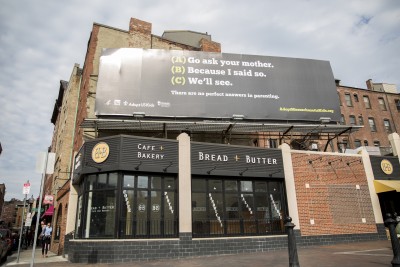
A billboard implying that the Armenian genocide was a hoax was removed Thursday from Boston’s North End, according to the billboard company.
Michael Demirchian, president of the Armenian Student Association at Northeastern University, wrote in an email that the billboard was sponsored by Turkic Platform. The nonprofit group was “established to bring all the Turks and Turkish movements living and operating in different part of the world together,” according to Turkic Platform’s website.
Demirchian said he and other students advocated for the billboard’s removal.
“Some members of the various Armenian Student Associations in the Greater Boston area helped instantiate the reporting process,” Demirchian wrote. “I began by posting the tweet on Facebook, and before I knew it, a Facebook event was generated to call the vice president of Clear Channel Outdoor-Boston in order to use the power of numbers to take down the highly offensive billboard that shouldn’t have received approval in the first place.”
The billboard advertised the website FactCheckArmenia.com, which denies the Armenian genocide of the early 1900s.
Jason King, a spokesperson for Clear Channel Outdoor, confirmed that the billboard was taken down.
Demirchian said he wonders how the billboard received approval.
“The creators were not shy to add that the Turkic Platform was funding the billboard, which brings me to question the morals and logic behind creating a website that uses falsified information to promote denial of the occurrence of the Armenian Genocide,” Demirchian wrote in the email. “Denial of the truth almost 101 years afterward is almost sickening.”
Harlow Robinson, a history professor at Northeastern, said Boston has a large Armenian community, and this billboard demonstrated the bigger issue of genocide denial throughout the world.
“This is part of this whole campaign that is connected to the Turkish government to some extent, and this has been a very big issue for many years now — this genocide denial, which is very similar to Holocaust denial,” Robinson said. “It’s easier in the Armenian case to do that because it is very far away.”
Robinson said Americans have difficulty relating to the Armenian community because they have little knowledge about the country.
“Almost no Americans have been to Armenia, whereas many Americans have been to Germany and had relatives involved with the Holocaust,” Robinson said. “It is an issue that has been more difficult for Americans to understand or embrace, so, and as I said, it stems from the very ancient religious tensions between Muslims and Christians in Armenia and eastern Turkey.”
Boston residents had mixed views on the billboard. While some saw it as offensive, others cited the first amendment and the right to free speech.
Anne Jarek, 39, of Charlestown, said she saw an article about the billboard, and after looking into the issue, she was glad it was taken down.
“I didn’t know about it, but then I looked into it, and that’s not okay,” Jarek said. “Given the Armenian population in Watertown and Boston, there’s no denying things that happened.”
Kate Noyes, 28, of Jamaica Plain, said although denying the Armenian Genocide is matter of free speech, all parties should be aware of its consequences.
“They have the right to do that in America,” she said. “But if they want to remain a company that clients would want to do business with, they have to understand people could be pissed about it. It can be a PR disaster for them.”
David Wilson, 26, of Kenmore, said although buying billboard space comes with the liberty of deciding its content, the contractor reserves the right to halt the lease if they want to.
“If you buy the rights to a billboard, you have the right to put whatever you want up there,” he said. “They have the right to terminate the lease on the billboard … regardless of what they put up. If I was the landlord who owned the building, I might be angered by it.”


















































































































